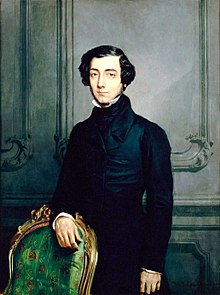Alexis de Tocqueville
Alexis Charles-Henri-Maurice Clérel, Viscount de Tocqueville (/ˈtoʊkvɪl, ˈtɒk-/;[4] French: [alɛgzi də tɔkvil]; 29 July 1805 – 16 April 1859) was a French diplomat, political scientist and historian. He was best known for his works Democracy in America (appearing in two volumes, 1835 and 1840) and The Old Regime and the Revolution.
Life
changeTocqueville was born in July 29, 1805 in Paris, France to a political family. His great grandfather, Chrétien de Malesherbes, was his political model and his father was a loyal royalist prefect and became a peer of France by King Charles X in 1827.[5]
As a young man, he became an apprentice magistrate. Preparing for his career in politics, he observed confrontations between the Conservatives and Liberals. François Guizot's lectures was a huge influence on him. He also became a close friend of Gustave de Beaumont.[5]
The 1830 July Revolution had a huge impact on Tocqueville. He believed that France is moving towards social equality.[5]
His nine-month visit to the United States, along with his friend Beaumont, in 1831 and 1832 created some of Tocqueville's famous work, the first part of the Democracy in America in 1835. This work made him famous as a political scientist.[5]
In 1836, he married Mary Mottley and published the final portion of the Democracy in America in 1840.[5]
In 1839, he was elected deputy from Valognes and was elected to the new legislative Assembly under France's Second Republic. He was appointed as Minister of Foreign Affairs. Beginning in 1850, he suffered from tuberculosis. He wrote his recollections and reflections such as those on the February Revolution. It was published in July 1851. As one of the representatives who opposed the coup d'etat by Louis-Napoleon, he was imprisoned.[6]
After his imprisonment, he retired from politics and make studies for his work, The Old Regime and the Revolution, published in January 1856. He then relocated to Cannes in October 1858. Six months later, he died on April 1859.[6]
Views
changeSlavery
changeIn the United States, Tocqueville believed that abolition did not eliminate racism, segregation, or hatred between black and white people. He predicted that this would weaken American democracy.[7]
In the French Caribbean, he suggested that the French learn from the English experience of abolition. He believed that successful abolition required legal changes and changes in attitudes.[7]
Democracy
changeTocqueville was an admirer of democracy particularly in the United States.[7] He was impressed by Americans' industriousness, resourcefulness, and ability to form voluntary associations to solve problems. He believed that democracy in America was not just about voting or laws but also about a mindset that valued personal initiative, social equality, and a commitment to public service.[8]
However, he was criticized for his views about the downside of popular governance by the masses or what he called as "tyranny of the majority".[7] Tocqueville argued that in a democratic society where the majority rules, there is a risk that the majority's opinions and preferences could become so big and dominant that the rights of minorities to speak their voices are not important or not really relevant for the most part.[8]
France
changeHe also studied a lot and found that many of the problems France had after the revolution were similar to the problems they had before. These were published in his book The Old Regime and the Revolution (1856). He believed that France was stuck in the past and wasn't as democratic as he had hoped. However, he was encouraged by the example of the United States, which was more democratic and free.[5]
References
change- ↑ Boucaud-Victoire, Kévin (2017). La guerre des gauches. Editions du Cerf.
- ↑ Véricour, Louis Raymond (1848). Modern French Literature. Gould, Kendall and Lincoln. p. 104.
- ↑ Lakoff, Sandoff (1998). "Tocqueville, Burke, and the Origins of Liberal Conservatism". The Review of Politics. 60(3): 435–464. doi:10.1017/S003467050002742X
- ↑ "Tocqueville". Random House Webster's Unabridged Dictionary.
- ↑ 5.0 5.1 5.2 5.3 5.4 5.5 "Alexis de Tocqueville | French Historian, Political Writer & Social Critic | Britannica". www.britannica.com. 2024-09-06. Retrieved 2024-10-24.
- ↑ 6.0 6.1 "Tocqueville, Alexis de". France in the United States / Embassy of France in Washington, D.C. Retrieved 2024-10-24.
- ↑ 7.0 7.1 7.2 7.3 Maussen, Marcel (2023-12). "A post-colonial reading of Alexis de Tocqueville's writings on slavery and its aftermaths". Ethnicities. 23 (6): 801–821. doi:10.1177/14687968231192036. ISSN 1468-7968.
{{cite journal}}: Check date values in:|date=(help) - ↑ 8.0 8.1 "The Tyranny of the Majority | United States History I". courses.lumenlearning.com. Retrieved 2024-10-24.
Other websites
change- Works by Alexis de Tocqueville at Project Gutenberg
- Works by or about Alexis de Tocqueville at Internet Archive
- Works by Alexis de Tocqueville at LibriVox (public domain audiobooks)
